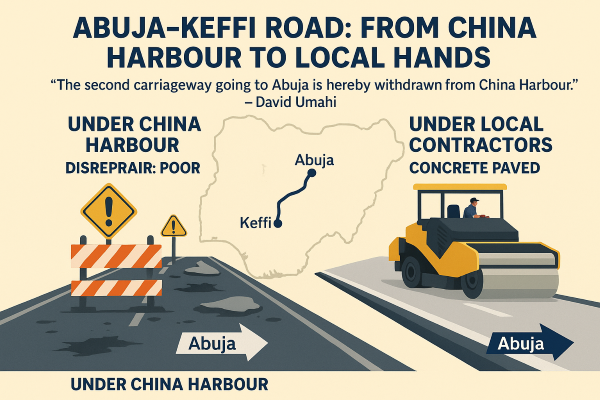Abuja–Keffi Road: Umahi Sacks China Harbour for Poor Performance, Engages Local Contractors

The Minister of Works, Engr. David Umahi, has ordered the withdrawal of the Abuja-bound carriageway of the ongoing Mararaba–Keffi Road reconstruction project from China Harbour Engineering Company Limited, citing poor performance, insubordination, and disregard for ministerial directives.
During an inspection of the 43.65-kilometre dual carriageway on Saturday, Umahi expressed disappointment at the contractor’s slow pace of work, stating that the project will now be handled by indigenous contractors to ensure speed, accountability, and quality delivery.
“I am disappointed with the Abuja-bound carriageway. China Harbour has been uncooperative and non-responsive to directives. Some contractors see federal projects as cash cows rather than partnerships for national development,” Umahi said.
He added that it took “several interventions” to compel the Chinese firm to maintain the carriageway they were not actively working on — a failure that endangered motorists and delayed progress.
Local Contractors to Take Over Immediately
Umahi announced that from Sunday, October 12, local contractors will be mobilised to site to complete both the inner and outer shoulders of the carriageway using reinforced concrete, a material he has consistently advocated as more durable for Nigerian climatic conditions.
He explained that the Ministry of Works had previously issued a directive mandating all contractors to ensure that entire project stretches remain motorable, even while under construction, through temporary stone base stabilisation.
“No contractor is allowed to lay pavement without completing the shoulders and wearing course. Any deviation from this directive causes premature road failure,” he warned.
Umahi condemned the continued issuance of payment certificates to non-compliant contractors, describing the practice as “unacceptable” and a major cause of road degradation nationwide.
Accountability, Not Excuses
Reiterating his reformist stance, Umahi cautioned that contractors hiding under political influence or bureaucratic bottlenecks will no longer be tolerated.
“Some contractors believe they have powerful connections and can ignore instructions. That era is over. The welfare and safety of road users are more important than anyone’s profit,” he declared.
The minister, who has visited the site more than five times, lamented persistent non-compliance despite repeated directives. He warned that Controllers and Directors in the Ministry who fail to report such issues within 24 hours would be recalled or face disciplinary action.
“Any bureaucracy that causes public suffering must be broken. The President has released funds; no one should collude with contractors to delay work,” Umahi added.
He also tasked state governments to monitor contractors closely and report those who arrive with inadequate equipment or substandard materials. “Such contractors will be removed immediately,” he assured.
Presidential Backing and Anti-Corruption Stand
Umahi thanked President Bola Ahmed Tinubu for supporting decisive actions aimed at improving project delivery and restoring integrity in the Works Ministry.
He revealed that some contractors, after being sanctioned, attempt to malign the Ministry through political allies, but Tinubu’s firm backing has made it possible to enforce standards.
“If anyone in the Ministry asks you for money, report it publicly. We will take tough action. This administration stands for transparency and accountability,” he said.
Background: The Abuja–Keffi Corridor Challenge
The Mararaba–Keffi dualisation is one of the busiest corridors in the North-Central region, serving as the gateway linking Abuja to Nasarawa, Benue, Plateau, and the North-East. The project, initially awarded to China Harbour Engineering Company, was part of Nigeria’s infrastructure modernization drive aimed at easing congestion and improving trade mobility between the Federal Capital Territory and the Middle Belt.
However, the corridor has been plagued by delays, traffic bottlenecks, and poor project supervision. Several inspection visits by Umahi and the Ministry’s technical team since 2023 revealed substandard materials, weak drainage systems, and incomplete shoulders — major factors behind recurring traffic disruptions.
The decision to reassign the Abuja-bound lane to local firms signals a turning point in Nigeria’s infrastructure strategy, promoting indigenous engineering capacity and reduced dependence on foreign contractors whose performance often falls short of expectations.
BRANDECONOMY Analysis: A Shift in Nigeria’s Infrastructure Doctrine
Umahi’s bold move underscores a paradigm shift in Nigeria’s public works policy — one that prioritises local content, quality assurance, and fiscal discipline over political patronage and foreign dependence.
Analysts believe the policy could reinvigorate the domestic construction sector, providing opportunities for competent Nigerian contractors to prove their capability and strengthen the local value chain.
However, industry observers warn that success will depend on consistent monitoring, timely funding, and strict enforcement of penalties for poor performance — both for local and foreign firms alike.
If effectively implemented, the Mararaba–Keffi intervention could become a model for transparent project delivery under the Renewed Hope infrastructure agenda.












